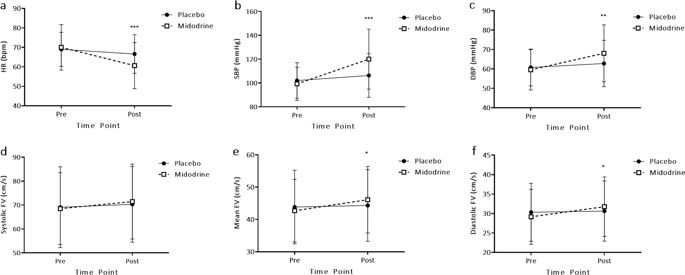Spinal Cord ( IF 2.1 ) Pub Date : 2020-03-17 , DOI: 10.1038/s41393-020-0448-0 Jill M Wecht 1, 2, 3 , Joseph P Weir 4 , Caitlyn G Katzelnick 1, 5 , Nancy D Chiaravalloti 5, 6 , Steven C Kirshblum 5, 6, 7 , Trevor A Dyson-Hudson 5, 6 , Erica Weber 5, 6 , William A Bauman 1, 2, 3

|
Study design
Clinical trial.
Objectives
Individuals with spinal cord injury (SCI) above T6 experience impaired descending cortical control of the autonomic nervous system, which predisposes them to hypotension. However, treatment of hypotension is uncommon in the SCI population because there are few safe and effective pharmacological options available. The primary aim of this investigation was to test the efficacy of a single dose of midodrine (10 mg), compared with placebo, to increase and normalize systolic blood pressure (SBP) between 110 and 120 mmHg during cognitive testing in hypotensive individuals with SCI. Secondary aims were to determine the effects of midodrine on cerebral blood flow velocity (CBFv) and global cognitive function.
Setting
United States clinical research laboratory.
Methods
Forty-one healthy hypotensive individuals with chronic (≥1-year post injury) SCI participated in this 2-day study. Seated SBP, CBFv, and cognitive performance were monitored before and after administration of identical encapsulated tablets, containing either midodrine or placebo.
Results
Compared with placebo, midodrine increased SBP (4 ± 13 vs. 18 ± 24 mmHg, respectively; p < 0.05); however, responses varied widely with midodrine (−15.7 to +68.6 mmHg). Further, the proportion of SBP recordings within the normotensive range did not improve during cognitive testing with midodrine compared with placebo. Although higher SBP was associated with higher CBFv (p = 0.02), global cognitive function was not improved with midodrine.
Conclusions
The findings indicate that midodrine increases SBP and may be beneficial in some hypotensive patients with SCI; however, large heterogeneity of responses to midodrine suggests careful monitoring of patients following administration.
Clinical trials registration
NCT02307565.
中文翻译:

双盲,安慰剂对照的交叉试验,用于确定米多君对SCI患者进行认知测试时对血压的影响。
学习规划
临床试验。
目标
脊髓损伤(SCI)高于T6的患者,其自主神经系统的皮质控制功能下降,这使他们易患低血压。但是,由于很少有安全有效的药理学选择,因此在SCI人群中低血压的治疗并不常见。这项研究的主要目的是测试与安慰剂相比的单剂量米多君(10 mg)在认知能力低下患有SCI的个体中在110至120 mmHg之间增加和正常化收缩压(SBP)的功效。次要目的是确定米多君对脑血流速度(CBFv)和整体认知功能的影响。
设置
美国临床研究实验室。
方法
患有慢性SCI(≥1年)的41位健康降压个体参加了为期2天的研究。在服用含米多君或安慰剂的相同封装片剂之前和之后,监测坐姿的SBP,CBFv和认知能力。
结果
与安慰剂相比,米多君提高了SBP(分别为4±13 vs. 18±24 mmHg;p <0.05);然而,米多君的反应差异很大(-15.7至+68.6 mmHg)。此外,与安慰剂相比,在用米多君进行认知测试期间,血压正常范围内的SBP记录比例并未提高。尽管较高的SBP与较高的CBFv相关(p = 0.02),但米多君并不能改善整体认知功能。
结论
研究结果表明米多君可提高SBP,对某些SCI低血压患者可能有益。但是,米多君反应的异质性很大,建议在给药后仔细监测患者。
临床试验注册
NCT02307565。











































 京公网安备 11010802027423号
京公网安备 11010802027423号